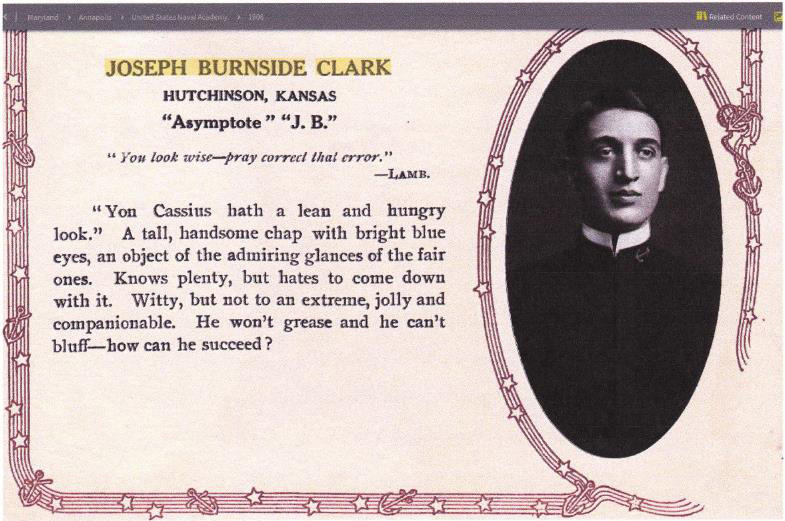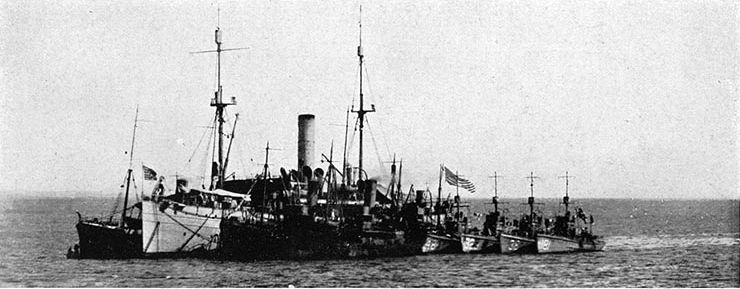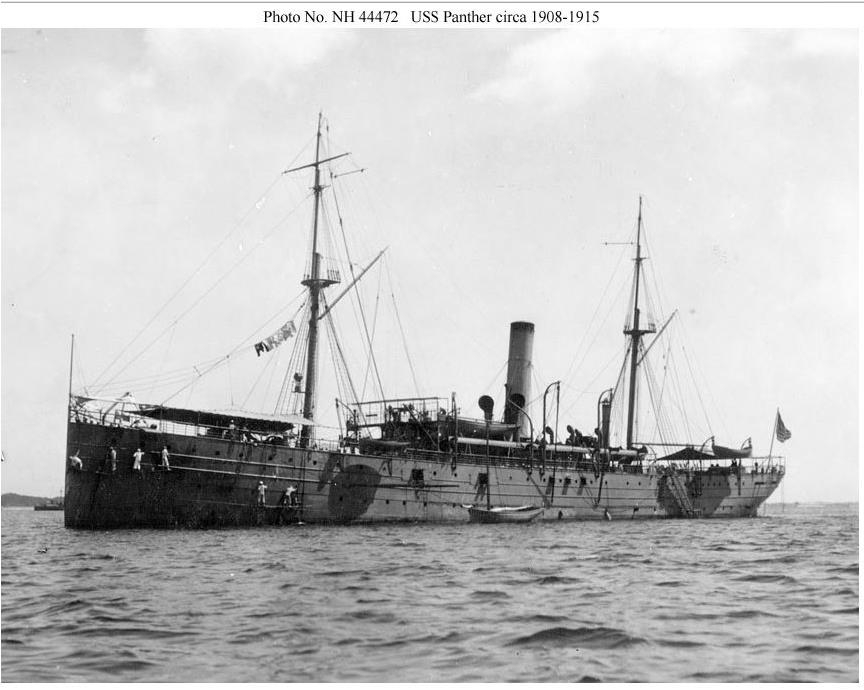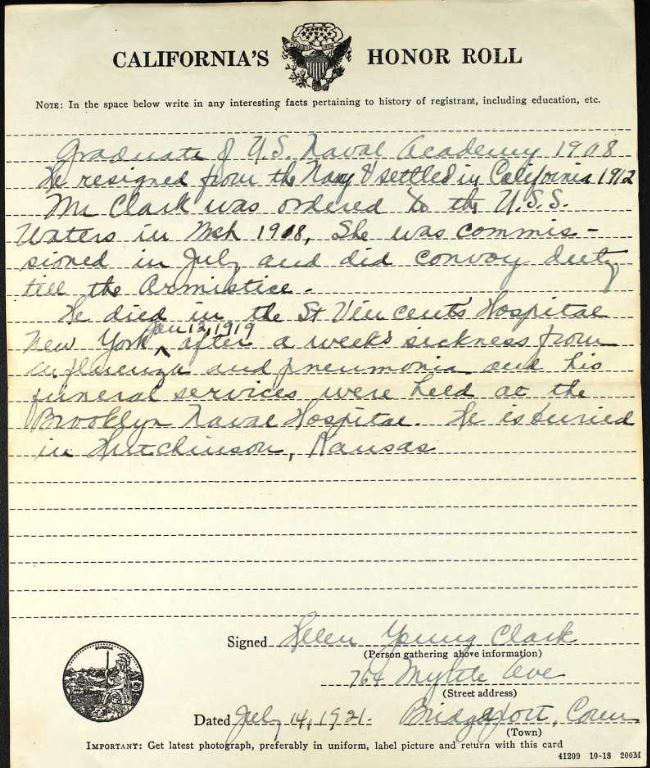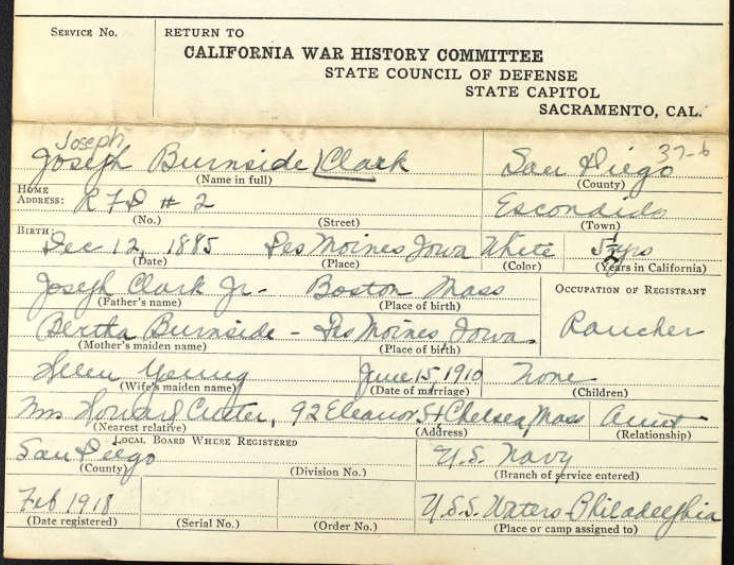Brief Biography of Joseph Burnside (J. B.) Clark
Born: December 8, 1885
Died: January 12, 1919 (age 34)
During the first meeting of the group that formed the Post on the 24th of November 1919, it was decided to name the Post for J. B. Clark. He had been a friend of most of the organizers and had been well-known and well thought of in the little community. He had gone on duty with the Navy from Escondido and was one of the few who had not returned from World War I. Clark died of pneumonia in New York City on January 12, 1919 following an attack of influenza while still on active duty.
Joseph Burnside Clark was born in Des Moines, Iowa, December 8, 1885. In the early 90’s Clark’s parents moved to Hutchinson, Kansas, where he met Lloyd Woodnut. The two became fast friends, a friendship which lasted many years.
Lloyd Woodnut, a resident of Escondido, says that Clark, who as a boy was known to his friends as Bernie, later on as J. B., was about one year older. He said from his boyhood days J. B. was a likeable, most serious minded fellow who always had an interest in the military. As he grew older he became a tall, slender young man – a description of him when Woodnut last saw him.
When living in Hutchinson, J. B.’s father was a traveling man and was out of town a great deal. This left J. B. much of the time alone with his step-mother. He didn’t mind this so much but would have liked to have a man about. Soon J. B. was sent to the Naval Academy-Annapolis, Maryland after attending St. John’s Military Academy in Salina, Kansas.
Woodnut moved to Seattle, Washington, however, the two periodically corresponding with each other. In 1912 Woodnut received a letter which informed him that J. B. had resigned from the Navy and was marrying a childhood sweetheart from Hutchinson and was moving to Escondido where he was going to raise chickens. He asked Woodnut to visit him there. Woodnut did, and remained in Escondido.
J. B. Graduated from the Naval Academy in 1904. Woodnut said J. B. Told him he had spent most of his time on destroyers and that he had made a trip around the world in President Teddy Roosevelt’s Great White Fleet.
In Escondido, J. B. bought 24 acres of land on Park Hill for $600, and built a home and started construction of chicken houses.
During that time in Escondido’s history there were about 1,200 people in the little community with their main source of amusement coming from dances and amature theatricals. According to Woodnut, J. B. was quite active in community life. Among his other accomplishments, he was a mandolin player and frequently used to play at dances and at other entertainments.
A few years after J. B.’s arrival in Escondido, the little town became somewhat disturbed by reports of a Mexican bandit named Pancho Villa, who was making disastrous raids across the border into the States. The men formed a Home Guard unit with the militarily trained J. B. at its head.
Adventuresome souls, J. B. and Woodnut made a trip to Tijuana, Mexico to visit a Mexican fort during a period of Pancho Villa’s rampage. The engine of the car they were driving died in front of the fort. The ramparts immediately were manned by swarms of Mexican soldiers. With a little difficulty the engine was started and the two young men beat a hasty retreat back to Escondido, Woodnut not being certain that he would ever be quite the same again.
At the beginning of World War I, J. B. Was called back into service, again assigned aboard a destroyer, the USS Waters. Clark died of pneumonia in New York City on January 12, 1919 following an attack of influenza while still on active duty
Following J. B.’s death his widow sold some of the property, later she remarried and moved to Phoenix, Arizona.
Records indicate that J. B. Clark lived in Escondido 5 ½ years. His occupation is listed as “Rancher”.
He married Hene Yeung, June 15, 1910 in Hutchinson, Kansas. They had no children. Her last listed address was reported on July 14, 1921; 764 Myrtle Avenue Bridgeport, Connecticut. His Aunt, Mrs. Howard Cutter of Chelsea, Massachusetts is listed as his nearest relative. His father, Joseph Clark Jr., was from Boston. His mother, Bertha Burnside was from Des Moines.
In 1908 he served aboard the USS Panther, a part of Teddy Roosevelt’s “Great White Fleet”. During 1918, J. B. Served aboard the Destroyer USS Waters.
World War I
Although her active service began late in World War I, Waters still managed to get in two round-trip voyages to the British Isles and one to the Azores before the armistice in November 1918. On 11 August, she joined a convoy at Tompkinsville, New York, and put to sea for England. She escorted her charges safely into Devenport on 23 August and stood out again four days later in the screen for four ships headed home.
The destroyer delivered the small convoy at New York on 6 September and, following a three-day layover, departed once again—this time bound for Ireland. Eleven days later, she entered the port at Buncrana. She remained there for eight days before again putting to sea. On 8 October, Waters arrived in New York and, but for a run to Newport, Rhode Island, on 31 October and 1 November, remained there until she put to sea with a convoy again on 4 November. This one was made up of 11 merchantmen bound for the Azores. Waters and her convoy were still three days steaming time from Ponta Delgada on 11 November 1918, when the armistice brought hostilities in Europe to a close. She entered the Portuguese island port with the convoy on the 14th. Eight days later, Waters headed west again and arrived at New York on the 28th.

